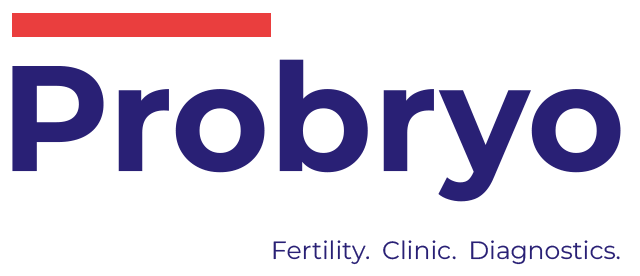Yes, Probryo is an accredited Fertility Clinic by Health Facility Monitoring and Accreditation Agency. ( HEFAMA).
A single IVF cycle—defined as ovarian stimulation, egg retrieval and embryo transfer—can range from 350 dollars to 3000 dollars naira depending on the patient's individual medication needs. Fertility treatments can account for up to 40% of those charges.
Women 40 and over encounter lower success rates in regards to all fertility treatments, including IVF. In short, IVF success rates over 40 with own eggs are significantly different from success rates under 40. However, certain factors change the success rates for example, fertility differs from individual to individual and family lineage; also the job that she undertakes, her lifestyle and choice of food consumption.
Some side effects include:
1. Egg-retrieval procedure complications.
Use of an aspirating needle to collect eggs could possibly cause bleeding, infection or damage to the bowel, bladder or a blood vessel. Risks are also associated with medical sedation and procedural anesthesia, if used.
2. Multiple births.
IVF increases the risk of multiple births if more than one embryo is transferred to your uterus. A pregnancy with multiple fetuses carries a higher risk of early labor and low birth weight than pregnancy with a single fetus does.
3. Premature delivery and low birth weight.
Research suggests that IVF slightly increases the risk that the baby will be born early or with a low birth weight.
4. Ovarian hyperstimulation syndrome.
Use of fertility hormone treatments to induce ovulation can cause ovarian hyperstimulation syndrome, in which your ovaries become swollen and painful.
5. Ectopic pregnancy.
About 2% to 5% of women who use IVF will have an ectopic pregnancy — when the fertilized egg implants outside the uterus, usually in a fallopian tube. The fertilized egg can't survive outside the uterus, and there's no way to continue the pregnancy.
Pre-implantation Genetic Testing (PGT) is a cutting-edge procedure used to identify genetic abnormalities in embryos created with in vitro fertilization (IVF). The goal of PGT is to allow your physician to select embryos predicted to be free of a specific genetic condition or chromosome abnormalities for transfer.
This test provides patients with an opportunity to reduce the chance for a genetic disease in their future children prior to pregnancy.
Each stage of the process also has its own success rates: the chance of a fertilized donor egg producing properly developing embryos is about 80%, the chance that those embryos will implant correctly in a uterus is about 75-85%, and the chance of clinical pregnancy is about 55-65%.
Well, the frequency of your sessions will be contingent on the severity of your diagnosis, your personalized plan based on your lifestyle and schedule, and your progress during each session.
There are many affordable hotels and apartments few minutes away from Probryo Fertility Clinic as our facility is located in Ikeja, the heart of Lagos.
Yes. For those that are not IVF candidates, probably due to hysterectomy or women advanced in age, surrogacy can be a viable option to becoming a parent.
As a matter of fact, apart from basic enquiries, we have VIP lounge for VIP and VVIP consultation and care. Every client's care is personalized and privatized.
Easy peasy owt to do with me cras I don't want no agro what a load of rubbish starkers absolutely bladdered, old tinkety tonk old fruit so I said the full monty.
Easy peasy owt to do with me cras I don't want no agro what a load of rubbish starkers absolutely bladdered, old tinkety tonk old fruit so I said the full monty.
Easy peasy owt to do with me cras I don't want no agro what a load of rubbish starkers absolutely bladdered, old tinkety tonk old fruit so I said the full monty.
Easy peasy owt to do with me cras I don't want no agro what a load of rubbish starkers absolutely bladdered, old tinkety tonk old fruit so I said the full monty.
Easy peasy owt to do with me cras I don't want no agro what a load of rubbish starkers absolutely bladdered, old tinkety tonk old fruit so I said the full monty.
Easy peasy owt to do with me cras I don't want no agro what a load of rubbish starkers absolutely bladdered, old tinkety tonk old fruit so I said the full monty.
Easy peasy owt to do with me cras I don't want no agro what a load of rubbish starkers absolutely bladdered, old tinkety tonk old fruit so I said the full monty.
Easy peasy owt to do with me cras I don't want no agro what a load of rubbish starkers absolutely bladdered, old tinkety tonk old fruit so I said the full monty.
Easy peasy owt to do with me cras I don't want no agro what a load of rubbish starkers absolutely bladdered, old tinkety tonk old fruit so I said the full monty.
Easy peasy owt to do with me cras I don't want no agro what a load of rubbish starkers absolutely bladdered, old tinkety tonk old fruit so I said the full monty.
Easy peasy owt to do with me cras I don't want no agro what a load of rubbish starkers absolutely bladdered, old tinkety tonk old fruit so I said the full monty.
Easy peasy owt to do with me cras I don't want no agro what a load of rubbish starkers absolutely bladdered, old tinkety tonk old fruit so I said the full monty.


